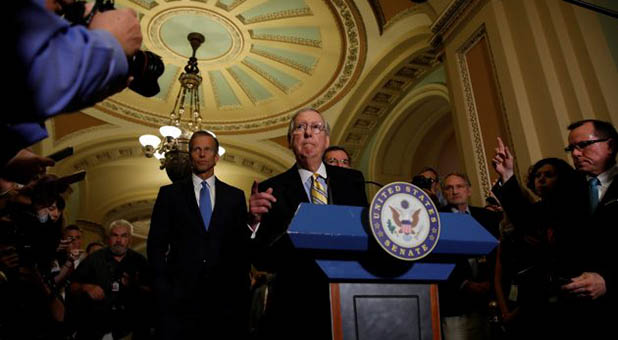Pressure Is Mounting to Repeal Obamacare Now, Replace It Later
U.S. Sen. Chuck Grassley, R-Iowa, the third-longest serving Republican in the Senate, hit the nail on the head with his critique of fellow GOP senators on Twitter over the weekend:
52 Republican senators [should] be ashamed that we have not passed health reform by now. We won’t be ashamed; we will go from majority to minority!
He’s not alone in that assessment. Voters were told in 2010 they needed to give the GOP control of the House of Representatives to get Obamacare repealed. It didn’t work.
Voters were told in 2014 they needed to give Republicans control of the Senate to get Obamacare repealed. It didn’t work.
Voters were told in 2016 that if they gave the GOP a “unified government” in control of both the legislative and executive branches of government, they would finally be able to repeal Obamacare. And now, nearly six months into President Donald Trump’s first term in office, we’re no closer to a repeal of Obamacare than we were seven years ago.
The president got the ball rolling over the weekend when he tweeted his support for a move to “repeal now, replace later.” He has since ramped up his rhetoric, warning Congress against taking its annual August recess without passing a health care bill:
I cannot imagine that Congress would dare to leave Washington without a beautiful new HealthCare bill fully approved and ready to go!
He also retweeted a video put out by FOX News Channel in which Sen. Ted Cruz, R-Texas, calls on Congress to skip the August recess to get a health care bill adopted. The senator also has an amendment to the Senate’s Better Care Reconciliation Act that would put it more in line with the House’s American Health Care Act, which narrowly passed in May.
The Consumer Choice Amendment got some major support from Vice President Mike Pence on Monday, too. During an interview with nationally syndicated radio host Rush Limbaugh, he said:
[T]he president made a couple of commitments on the campaign trail, and we worked to keep those when the bill passed the House, which is your kids can stay on your family health insurance plan ’til they’re 26. And we obviously went to great pains to make sure that Americans with pre-existing conditions could not be denied coverage.
Those regulations and those protections are all intact in the House and in the Senate bill. But to your point: There’s a broad range of other regulations that the House allowed to be waived, that frankly Senator Cruz has developed some very creative proposals. Including freedom policies, which would say to a state, “Look, if you offer an insurance plan that meets what remains of the federal regulations, then you can also offer—to Americans—to be able to buy a health insurance product that doesn’t meet those same criteria.”
You know, Rush, that’s what freedom looks like, isn’t it? I mean, come on! We’re talking about people being able to go to a marketplace and to say, “Look, if I want all the benefits that are listed here, some of which are certified by the state or even the federal government, I’ll pay for that. If I don’t want all of those benefits, I ought to be able to buy that as well.” That’s ultimately a free market principle where President Trump is driving health care reform, but it all begins with repealing and replacing Obamacare.
To his credit, the vice president said he was unwilling to speculate as to the motives for why some Republicans in the Senate are unwilling to repeal Obamacare. But some conservatives in Congress aren’t as unwilling. House Freedom Caucus Chairman Mark Meadows, R-N.C., called into The Sean Hannity Show about the same time the vice president was speaking with Limbaugh and dropped a bomb of his own.
According to Meadows and Rep. Jim Jordan, R-Ohio, there is reason to believe several key parts of the House’s health care bill weren’t “scored” by the Congressional Budget Office, at Senate Majority Leader Mitch McConnell’s request. They said they believe the Kentucky Republican is attempting to kill the repeal effort because he actually wants to keep the law in place—in violation of years of campaign promises to repeal it.
Meadows said that if this turns out to be true, there will be “open war” between conservatives and the Republican Party establishment. Such a war is likely to have drastic consequences, not only for the GOP, but for the president’s agenda and his ability to continue the foundational changes to Washington, D.C., known as “draining the swamp.” {eoa}














































